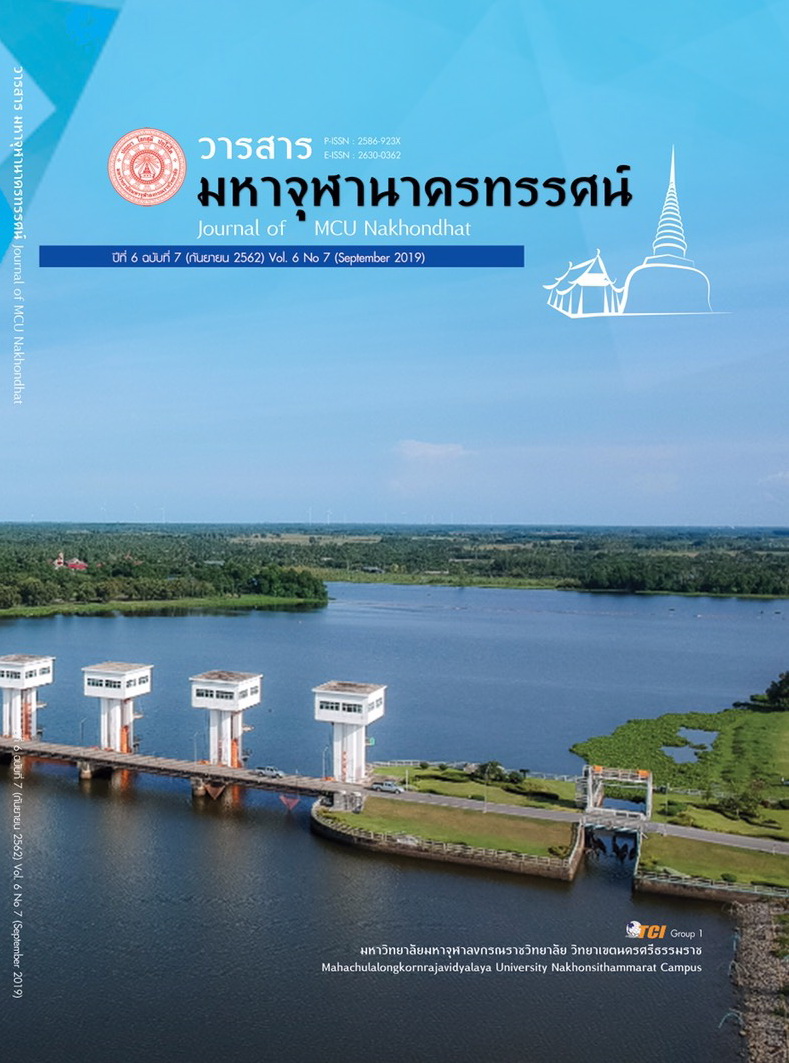THE POLITICS OF CULTURAL RIGHTS FOR PROTECTING WAYS OF LIFE OF PGAZ K’NYAU IN THE UPPER PART OF THE NORTH
Main Article Content
Abstract
The purposes of the research were 1) to study the process for creating meanings and understanding of cultural rights for fighting, negotiating, and preserving the ways of life of Pgaz K’Nyau tribe, 2) to investigate the operating mechanism of the government sections for the movement and cultural rights of Pgaz K’Nyau tribe and to analyze the impacts of new management model of the government sections for natural resource management on the movements for protecting the ways of life of Pgaz K’Nyau tribe. The primary data was collected by an interview form from forty key informants. The informants consisted of people who got the influence from the implementation of the government policies, village headmen, sub-district headmen, chief executives of the Sub-district Administrative Organizations, spiritual leaders and leaders of the Christian pastor, leaders of public organizations and specialists in racism development center of Chiang Mai University. The secondary data was collected from 1) in-depth interview, 2) attending the academic seminars and observing the public sector networks in the research areas, 3) observation, 4) focus group discussion. The data were analyzed, synthesized and concluded by descriptive research method.
Findings were as follows:
The research study showed that the cultural rights were a basic participatory strategy for the Pgaz K’Nyau to access the natural resources, obey the regulations and accept other equal rights. Additionally, the movements were their cultural rights for negotiating with the government sections. The study indicated that the strength of their movements was an important strategy for communicating, understanding and negotiating between the Pgaz K’Nyau and the government sections for conflict management. The movements were basic and important strategies and cultural rights for protecting and utilizing the natural resources of the Pgaz K’Nyau. They followed the regulations strictly to protect the community forest, farming areas, housing zone, and forestry plantation. Lastly, GPS was a new necessary system employed by the Pgaz K’Nyau for solving deforestation, conflict management and building the participations. However, the study revealed that the Pgaz K’Nyau have not understood the government policies and practical guidelines precisely.
Article Details
References
คณะกรรมการประสานงานองค์กรเอกชนพัฒนาชนบท ภาคเหนือ (กป.อพช.เหนือ). (2552). ขบวนการออกเอกสารสิทธิ์ในที่ดิน การนำที่สาธารณะประโยชน์ที่ชาวบ้านเคยใช้ประโยชน์ร่วมกันไปออกเอกสารสิทธิ์. เรียกใช้เมื่อ 16 เมษายน 2560 จาก https://ncodcm.wordpress.com
คณะกรรมาธิการปฏิรูปทรัพยากรธรรมชาติและสิ่งแวดล้อม. (2558). วาระปฏิรูปที่ 11: ปฏิรูปที่ดินและการจัดการที่ดิน. กรุงเทพมหานคร: สภาปฏิรูปแห่งชาติ.
ชลธิรา สัตยาวัฒนา. (2546). สิทธิชุมชนท้องถิ่น จากจารีตประเพณีสู่สถานการณ์ปัจจุบัน: การศึกษาเพื่อแสวงหาแนวทางนโยบายสิทธิชุมชนท้องถิ่นในประเทศไทย. กรุงเทพมหานคร: ศูนย์มานุษญวิทยาสิรินธร (องค์กรมหาชน).
ชูศักดิ์ วิทยาภัค. (2558). วัฒนธรรมคืออำนาจ : ปฏิบัติการแห่งอำนาจ ตัวตน และชนชั้นใหม่ในพื้นที่วัฒนธรรม. เชียงใหม่: มหาวิทยาลัยเชียงใหม่.
นลินี ตันธุวนิตย์และคณะ. (2545). ประสบการณ์ต่อสู้ของชาวลุ่มน้ำมูล กรณีศึกษาเขื่อนปากมูลและเขื่อนราศีไศล. วิถีชีวิต วิธีสู้ : ขบวนการประชาชนร่วมสมัย , 4(1), 182-240 .
พร้อมพล สัมพันธโน. (2555). ภูมิปัญญาปกาเกอะญอกับการจัดการป่าชุมชน,สมาคมปกาเกอะญอเพื่อการพัฒนาสังคมและสิ่งแวดล้อม(ป.พล). เชียงใหม่: บริษัท สันติภาพแพ็คพริ้นท์ จำกัด.
มูลนิธิเพื่อการพัฒนาที่ยั่งยืนภาคเหนือ. (2558). การจัดการป่าโดยองค์กรเครือข่ายลุ่มน้ำโดยองค์กรชุมชน. ใน (อัดสำเนา).
ศยามล ไกยูรวงศ์และคณะ. (2545). ขบวนการเครือข่ายกลุ่มเกษตรกรภาคเหนือเพื่อพิทักษ์สิทธิชุมชนในการจัดการทรัพยากรธรรมชาติและการธำรงอัตลักษณ์ทางชาติพันธุ์. เชียงใหม่: สำนักพิมพ์ตรัสวิน (ซิลค์เวอร์บุคส์).
ศูนย์พัฒนาสงเคราะห์และชาวเขาจังหวัดเชียงใหม่. (2545). ทำเนียบชาวเขา. กรุงเทพมหานคร: กรมประชาสงเคราะห์ กระทรวงมหาดไทย.
ศูนย์อำนวยการต่อสู้เพื่อเอาชนะความยากจน. (2549). ขบวนภาคประชาชนเป็นศูนย์กลางในการแก้ไข ปัญหาความยากจนด้านที่ดิน. กรุงเทพมหานคร: สถาบันพัฒนาองค์กรชุมชน (องค์การมหาชน).
สำนักงานพัฒนาเทคโนโลยีอวกาศและภูมิสารสนเทศ (สำนักงานใหญ่). (2560). การเข้าร่วมประชุม ชุมชนปกาเกอะญอจัดการทรัพยากรธรรมชาติป่าไม้. เรียกใช้เมื่อ 16 เมษายน 2560 จาก https://gfms.gistda.or.th/node/48
อธิบดี กรมป่าไม้. (19 เมษายน 2560). การเมืองของสิทธิทางวัฒนธรรมในการปกป้องวิถีดำรงชีพปกาเกอะญอภาคเหนือตอนบน. (พร้อมพล สัมพันธโน, ผู้สัมภาษณ์)
อมรา พงศาพิชญ์. (2547). ความหลากหลายทางวัฒนธรรม : กระบวนทัศน์และบทบาทในประชาสังคม. (พิมพ์ครั้งที่ 4). กรุงเทพมหานคร: สำนักพิมพ์แห่งจุฬาลงกรณ์มหาวิทยาลัย.


